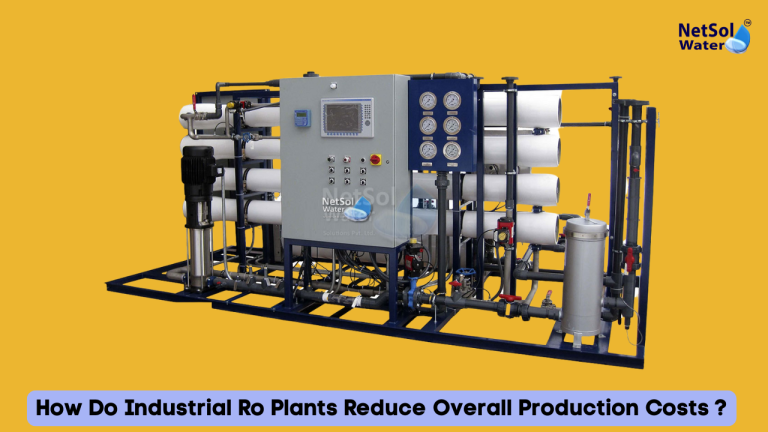
Given the industrial scenario today, water treatment is an essential process to achieve operational efficiency. Industrial RO plants save production costs by offering a consistent and affordable means for water treatment. Utilization of RO technology in industrial applications not only maximizes water quality but also provides several economic and operational advantages that contribute largely to the bottom line. In this blog, the ways in which industrial RO plants reduce overall production costs and improve operational efficiency will be discussed.
The Role of Industrial RO Plants in Reducing Production Costs
Water is an essential commodity to be used in various industries, from production to food production. Water quality to be utilized in industrial purposes should be in compliance with certain specifications. RO plants are designed with the capability to remove impurities like salts, minerals, bacteria, and heavy metals, thus making water suitable for utilization in production processes.
By installing industrial RO plants, companies can cut the water treatment expense, lower wastage, and even improve the overall quality of the end product. Industrial RO plants reduce overall production costs in various ways:
1) Lower Water Treatment Costs
Water treatment is most likely to be one of the high operation costs for companies that use water throughout production. Industrial RO plants lower the overall production cost by reducing the cost of water treatment. Conventional water treatment processes, such as chemical dosing or filtration, can be costly and need constant maintenance. RO systems are efficient and can treat a great amount of water using little energy and chemicals.
By creating good-quality, purified water at a lower expense, companies can do away with the necessity of chemical treatment that is costly and become cost-effective in general.
2) Greater Reusability of Water
Industrial RO plants stand out because they operate as effective water reuse and recycling systems. Many industries use significant water volumes while traditional treatment systems lack the capability to allow water reuse. Industrial RO plants help businesses decrease production costs through water recycling practices. Points of treated water become available for non-drinking purposes such as cooling and industrial cleaning and process operating solutions depending on the manufacturing sector.
By decreasing dependence on off-site water supplies and recycling treated water, companies are able to achieve a considerable decrease in their water acquisition costs and minimize environmental footprints.
3) Decrease in Down Time and Maintenance Expenses
The maintenance requirements for RO plant installations remain minimal when compared against typical water treatment solutions. Industrial reverse osmosis plants reduce production costs through lower maintenance needs alongside decreased downtime duration. The maintenance requirements of regular water filtration systems drive up operation expenses while also increasing unexpected shutdowns because of their filter changes and chemical protocols.
Since RO plants tend to incorporate fewer moving components and are easier to maintain, industries experience less downtime and a smoother water supply. Downtime is reduced, and an even production stream preserves profitability.
4) Better Product Quality
Water quality has a direct impact on product quality in food and beverage, pharmaceutical, and textile industries. Defective water causes defects, contamination, and reduced product yields, which create additional waste and production costs. Industrial RO plants reduce overall production costs by making certain that water utilized in the manufacturing process is clean and devoid of toxic impurities.
Through quality water provision, RO plants are able to evade product faults and wastage and thus optimize the whole process of production. Enhanced product quality also guarantees satisfaction from customers, which in turn may lead to enhanced sales and profitability.
5) Energy Efficiency
Even though RO plants use energy, their energy consumption is generally much less than that of conventional water treatment plants. Most conventional processes, for example, boiling or distillation, involve a lot of energy input in order to purify water. Large-scale RO plants lower the overall cost of production by using less energy and producing the same or even higher quality pure water.
The energy efficiency of the RO plants allows firms to decrease the cost of operation, hence having a cost-effective and sustainable manufacturing process.
6) Adherence to Regulations and Prevention of Fines
Manufacturing procedures are typically regulated by strict management of water quality and wastewater discharge effluent. Failure to conform to regulatory norms results in penalties and lawsuits that lead to unanticipated expenses. Industrial RO units are cost-efficient on production expense by keeping water used in the manufacturing process in line with regulatory norms.
By processing water as per quality specifications and disposing off wastewater, businesses can avoid large fines and continue their operations without interruptions. The installation of an RO plant helps businesses ensure compliance and avoid legal expenses.
7) Long-Term Cost Savings
Although the capital cost of industrial RO plants is extremely high, long-term gains are enormous. RO plants are easy to run and have an extremely long life. Businesses, over a period of time, are in a position to recover the initial investment through reduced costs of obtaining water, reduced consumption of chemicals, and saving energy. Reduced chemical usage in water treatment, fewer breakdowns, and more efficiency all amount to long-term savings.
Conclusion
Industrial RO plants reduce overall production costs by providing an inexpensive, efficient, and environmentally friendly means for water treatment. By improving the quality of the water, reuse of water, lower maintenance, and compliance, companies can decrease their operating costs significantly. With an industrial RO plant installed, not only does it offer long-term cost reduction but also increased product quality and operating efficiency, leading to increased overall profitability and sustainability.
Do you need an advice or assistance on selecting the best water and waste water treatment unit? We have solutions for all your problems!
Let us know your problem, our experts will make sure that it goes away.
For an assistance or related query,
Call on +91-9650608473
Or write us at enquiry@netsolwater.com
